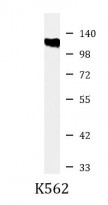ARG42712
anti-ATP Citrate Lyase phospho (Thr447 / Ser451) antibody
anti-ATP Citrate Lyase phospho (Thr447 / Ser451) antibody for ICC/IF,Immunoprecipitation,Western blot and Human,Mouse,Rat
Overview
| Product Description | Rabbit Polyclonal antibody recognizes ATP Citrate Lyase phospho (Thr447 / Ser451) |
|---|---|
| Tested Reactivity | Hu, Ms, Rat |
| Tested Application | ICC/IF, IP, WB |
| Host | Rabbit |
| Clonality | Polyclonal |
| Isotype | IgG |
| Target Name | ATP Citrate Lyase |
| Antigen Species | Human |
| Immunogen | Phosphospecific peptide around Thr447 / Ser451 of Human ATP Citrate Lyase. |
| Conjugation | Un-conjugated |
| Alternate Names | ACL; ATP-citrate synthase; Citrate cleavage enzyme; CLATP; EC 2.3.3.8; pro-S-; ATP-citrate; ATPCL |
Application Instructions
| Application Suggestion |
|
||||||||
|---|---|---|---|---|---|---|---|---|---|
| Application Note | * The dilutions indicate recommended starting dilutions and the optimal dilutions or concentrations should be determined by the scientist. |
Properties
| Form | Liquid |
|---|---|
| Purification | Affinity purified. |
| Buffer | 50 mM Tris-Glycine (pH 7.4), 150 mM NaCl, 0.01% Sodium azide, 40% Glycerol and 0.05% BSA. |
| Preservative | 0.01% Sodium azide |
| Stabilizer | 40% Glycerol and 0.05% BSA |
| Concentration | Batch dependent |
| Storage Instruction | For continuous use, store undiluted antibody at 2-8°C for up to a week. For long-term storage, aliquot and store at -20°C. Storage in frost free freezers is not recommended. Avoid repeated freeze/thaw cycles. Suggest spin the vial prior to opening. The antibody solution should be gently mixed before use. |
| Note | For laboratory research only, not for drug, diagnostic or other use. |
Bioinformation
| Database Links | |
|---|---|
| Gene Symbol | ACLY |
| Gene Full Name | ATP citrate lyase |
| Background | ATP citrate lyase is the primary enzyme responsible for the synthesis of cytosolic acetyl-CoA in many tissues. The enzyme is a tetramer (relative molecular weight approximately 440,000) of apparently identical subunits. It catalyzes the formation of acetyl-CoA and oxaloacetate from citrate and CoA with a concomitant hydrolysis of ATP to ADP and phosphate. The product, acetyl-CoA, serves several important biosynthetic pathways, including lipogenesis and cholesterogenesis. In nervous tissue, ATP citrate-lyase may be involved in the biosynthesis of acetylcholine. Multiple transcript variants encoding distinct isoforms have been identified for this gene. [provided by RefSeq, Dec 2014] |
| Function | Catalyzes the cleavage of citrate into oxaloacetate and acetyl-CoA, the latter serving as common substrate for de novo cholesterol and fatty acid synthesis. [UniProt] |
| Cellular Localization | Cytoplasm. [UniProt] |
| Calculated MW | 121 kDa |
| PTM | ISGylated. Acetylated at Lys-540, Lys-546 and Lys-554 by KAT2B/PCAF. Acetylation is promoted by glucose and stabilizes the protein, probably by preventing ubiquitination at the same sites. Acetylation promotes de novo lipid synthesis. Deacetylated by SIRT2. Ubiquitinated at Lys-540, Lys-546 and Lys-554 by UBR4, leading to its degradation. Ubiquitination is probably inhibited by acetylation at same site (Probable). [UniProt] |
Images (1) Click the Picture to Zoom In






